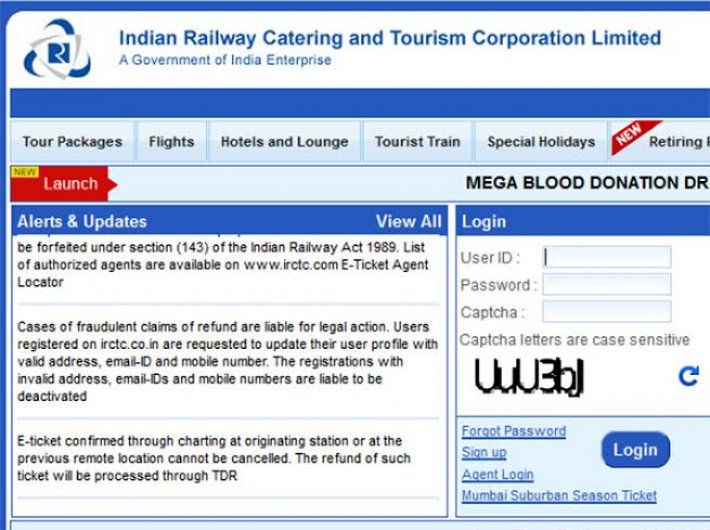The new system allows booking of 7,200 tickets per minute as against the earlier capacity of 2,000 tickets.
The Indian Railways is finally waking up to the full potential of digital technology. The Indian railway catering and tourism corporation (IRCTC) launched the next generation electronic ticketing system in partnership with the centre for railway information system (CRIS). So what does the new system give the average citizen? “The system aims to make the older league systems compatible with the latest available resources,” said Surender Joshi, joint general manager (IT) of IRCTC.
Next generation e-ticketing (NGeT) was officially launched on August 13, 2014 by union minister for railways Sadananda Gowda. An investment of Rs180 crore has been earmarked for all the phases of the system to be implemented over the next five years.
The project aims to principally tackle the problem of booking capacity of the IRCTC website. The new system allows an enhanced capacity of booking 7,200 tickets per minute as against the earlier capacity of 2,000 tickets per minute. This means that over 1.2 lakh concurrent users can log into a session as against 40,000 in the old system.
The average number of tickets being booked in a day has also gone up from five lakh to six lakh. The revamped website will be managed by CRIS, while IRCTC will handle the commercial aspects of the website, including the bank and customer interactions.
Explaining the breakup of the budget, Ramakant Tiwari, deputy general manager (IT), IRCTC, said, “The expenditure for the first year or the capex has come to about '80 crore, while the recurring and the annual management charge is estimated at around Rs 100 crore.” Explaining the hardware investment cycle of the project, Joshi said, “We are making the ticket booking process more efficient by increasing the number of servers handling the load of the website.”
Passengers at the core
Both Tiwari and Joshi point out that the initiative is an attempt to lessen the burden of the website at peak booking times: in short, making the common man’s experience of booking a ticket a pleasant one.
“The problem is during tatkal time. The fifteen minutes between 10:00-10:15 are critical. In these 15 minutes passengers could not log in. They would get frustrated. Now more people can log in,” Tiwari said.
“It is not a question of whether they get a ticket or not but now with the new system in place, they can at least see whether their ticket is waitlisted or not. Earlier, we used to stop (the log in) when the user number would hit 2,000. Now that has changed,” he explained further.
The project faced one major hurdle in its implementation in dealing with shifting all registered users to the new version without shutting down the site. Targeted for launch in April this year, the project had to be pushed back because it was peak season and IRCTC could not shut down the site while they shifted all the users to the more recent version. “The methodology we used was to shift the users alphabetically. So we migrated all the A users first and then the Bs, and so on,” Tiwari said.
The NGeT project does not plan to stop here. IRCTC is planning to make the website more citizen friendly by introducing a number of steps, including changing the financial methods. One of the more important steps that IRCTC is planning to take is to include RuPay as a mode of payment.
“In a month or two we are planning to integrate RuPay with the e-ticketing system. It’s still in the process. Let the card come in the market,” said Joshi. Announced by the government recently, the RuPay card will come with an Indian logo, similar to that of Visa and Mastercard. “So all the revenue that is going to Mastercard and Visa (out of India) will now remain in India,” Tiwari pointed out.
IRCTC also plans to introduce Railways Depository System (RDS) where in users can open an online account using which they can transfer money anywhere. The corporation is in talks with the national payment corporation of India (NPCI) to implement these steps and connect all the banks. IRCTC is also planning to move towards mobile applications. “We already had a Windows app with a third party partner. Now we are planning to bring out our own Android-based application,” Tiwari said.
The story appeared in the September 1-15, 2014 issue of the magazine.



